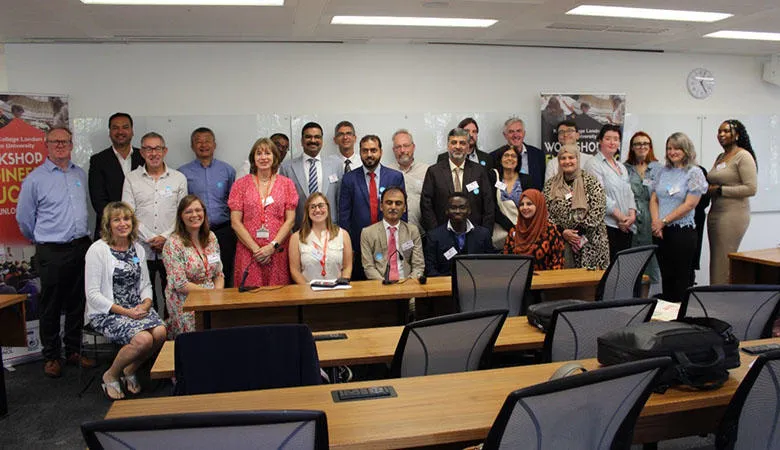In the UK over the last 10 years we’ve led the way in changing the engineering curriculum by implementing project-based learning."
Dr Tabbi Awotwe
02 October 2023
King's engineer partners with British Council to develop hands-on learning at overseas universities
The project led by Dr Tabbi Awotwe aims to equip graduates with the skills needed to tackle engineering challenges to further net zero
A project in collaboration with the British Council will see Dr Tabbi Awotwe, from the Department of Engineering, develop programmes to deliver practical learning at four universities around the world.
Led by King’s with Aston, Northumbria and Birmingham City universities partnering, the projects aim to develop engineering graduates with the skills to tackle real world challenges, such as developing renewable energy and battery powered cars.
An expert in engineering education innovation, Dr Awotwe will develop programmes tailored to universities in India, South Korea, Saudi Arabia and Pakistan around ‘project-based learning’ - which involves the practical, hands-on application of engineering skills to real-world engineering problems. The UK is currently a leader in this area of engineering education innovation.
Dr Awotwe said:
“Engineering education has traditionally focused on theory over practice. This has led to our graduates not being industry-ready when they enter the workforce, lacking the technical skills required to get started on projects.
“In the UK over the last 10 years we’ve led the way in changing the engineering curriculum by implementing project-based learning. At universities such as King’s, we design modules around challenges that students tackle, taking their learning from theory to practice. Now we want to package up this approach and share it with other countries around the world.”
The projects being designed by Tabbi and colleagues have a net zero focus, with the aim of equipping graduates with the skills to work in the field of clean energy or transport, to further efforts to reach net zero around the world.
We are optimistic that the successful completion of the project will see a paradigm shift in the development of engineering curricular and industry ready engineering graduates in Pakistan."
Saher Mirza, Assistant director of Higher Education Commission at the British Council in Pakistan
In India, the team are collaborating with Vellore Institute of Technology, and Industrial partner Ather Energy to develop projects on building electric vehicles. A similar project in Saudi Arabia sees the team aiming to equip students at the King Fahd University of Petroleum and Minerals with the skills to develop hydrogen fuel cells to power electric vehicles.
In South Korea the focus is on supporting graduates from Korea Maritime and Ocean University to reuse wastewater to produce hydrogen and electricity. In Pakistan the team will be helping to educate academic teaching staff throughout the country to understand the value of project-based learning, in particular in the development of wind turbines to produce renewable energy.
The modules developed with the institutions will be carried out jointly with industrial partners in UK. Partnering institutions will have the opportunity to interact with these companies, developing practical case studies for technology that could also be rolled out in UK - thereby supporting efforts to improve clean air zones and decarbonise cities in UK.
We hope that through our projects that incorporate hands-on learning and multidisciplinarity into curriculums, we’ll empower engineering students and their teachers to drive the development of decarbonising technologies around the world."
Dr Tabbi Awotwe
Saher Mirza, Assistant director of Higher Education Commission at the British Council in Pakistan said:
"The higher education commission is excited about this project aimed at preparing the next generation of engineers. We are optimistic that the successful completion of the project will see a paradigm shift in the development of engineering curricular and industry ready engineering graduates in Pakistan”
The programme of initiatives was kicked off recently with a project-based learning conference held King’s. Academics from Pakistan were invited to talks and workshops exploring the benefits of project-based learning in engineering, and demonstrations of hands-on learning activities in the lab.
"I’ve had the opportunity to establish working relationships with colleagues here in UK and more importantly, learnt what makes their adoption of project based learning plausible in their various institutions. I look forward to sharing the information and knowledge gained within the various departments in my university" – Professor Muhammad Tufail, Pro-Vice Chancellor, NED University of Engineering and Technology in Pakistan

Over the next year Dr Awotwe and the team will work with representatives across the partner institutions to support the implementation of project-based learning and monitor and evaluate its success, as well as continuing to seek feedback from students and staff and advise on teaching materials, as well as accreditation of the modules.
Dr Tabbi Awotwe said, “Skills gaps in engineering graduates around the world significantly hold back our ability to innovate and develop existing and new technologies to further net zero efforts.
“We hope that through our projects that incorporate hands-on learning and multidisciplinary approaches into curriculums, we’ll empower engineering students and their teachers to drive the development of decarbonising technologies around the world.
“The transferable skills acquired between partnering institutions will further consolidate knowledge and expertise on technologies that further clean energy and transportation, building a greener economy for those countries we’re working with."
